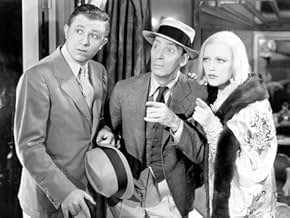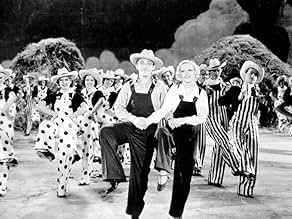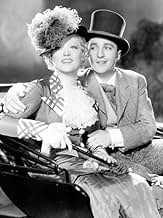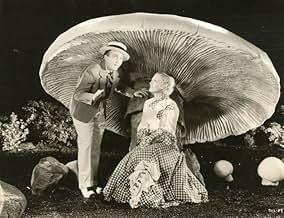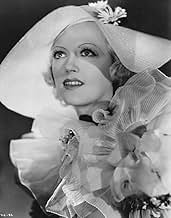IMDb-BEWERTUNG
6,1/10
1986
IHRE BEWERTUNG
Füge eine Handlung in deiner Sprache hinzuA love-struck teacher pursues a radio singer to Hollywood.A love-struck teacher pursues a radio singer to Hollywood.A love-struck teacher pursues a radio singer to Hollywood.
- Regie
- Drehbuch
- Hauptbesetzung
- Auszeichnungen
- 3 Gewinne & 1 Nominierung insgesamt
The Radio Rogues
- The Radio Rogues
- (as Three Radio Rogues)
Sam Appel
- Mexican Bartender
- (Nicht genannt)
Henry Armetta
- Henry Armetta
- (Archivfilmmaterial)
- (Nicht genannt)
Eddie Bartell
- Member - Three Radio Rogues
- (Nicht genannt)
Wallace Beery
- Wallace Beery - Premiere Clip
- (Archivfilmmaterial)
- (Nicht genannt)
Clara Blandick
- Miss Perkins - Divinity Teacher
- (Nicht genannt)
Harry Bowen
- Bartender
- (Nicht genannt)
Nora Cecil
- Briarcroft's Teacher
- (Nicht genannt)
Onest Conley
- Tap Dancer
- (Nicht genannt)
Ken Darby
- Member - The King's Men
- (Nicht genannt)
Jon Dodson
- Member - The King's Men
- (Nicht genannt)
Empfohlene Bewertungen
I watched this movie because I wanted to see what Marion Davies could do in a comedy, which is supposedly what she did best. She was an attractive woman, with - at least on screen - a pleasant, unpretentious personality, so I figured she might indeed do well in comedy.
But this script, by the much admired David Ogden Stewart, gives her nothing to work with. She delivers her lines ok, but the lines are so uninteresting that I don't know what Helen Hayes could have done with them.
Davies has to dance, and she's passable but no better. But then, no worse than Crawford or some other actresses of the era who were given dance numbers. Davies has to sing, and again, she's not bad, but nothing special.
In short, this movie doesn't make a case for Davies as an actress in comedy. It doesn't make her look bad, but it doesn't make you think she was a great comedian, either.
For me, the best thing, the only really good thing, in this movie was Bing Crosby's delivery of some of his musical numbers, in particular *Temptation*, a great song that he brings off very well. The other musical numbers, like the script, are bland and forgettable.
I'm surprised that Hearst, with all his money and power, couldn't have seen to it that Davies had better material. But then, perhaps the problem was not with her but with him: maybe he couldn't tell if a movie script was good or bad and imposed bad ones on her.
But this script, by the much admired David Ogden Stewart, gives her nothing to work with. She delivers her lines ok, but the lines are so uninteresting that I don't know what Helen Hayes could have done with them.
Davies has to dance, and she's passable but no better. But then, no worse than Crawford or some other actresses of the era who were given dance numbers. Davies has to sing, and again, she's not bad, but nothing special.
In short, this movie doesn't make a case for Davies as an actress in comedy. It doesn't make her look bad, but it doesn't make you think she was a great comedian, either.
For me, the best thing, the only really good thing, in this movie was Bing Crosby's delivery of some of his musical numbers, in particular *Temptation*, a great song that he brings off very well. The other musical numbers, like the script, are bland and forgettable.
I'm surprised that Hearst, with all his money and power, couldn't have seen to it that Davies had better material. But then, perhaps the problem was not with her but with him: maybe he couldn't tell if a movie script was good or bad and imposed bad ones on her.
Beautiful blonde French teacher Marion Davies (as Sylvia Bruce) quits her job to pursue radio crooner Bing Crosby (as Bill Williams) to Hollywood, where Mr. Crosby is going to star in a motion picture. In Los Angeles, Ms. Davies moves in with new pal Patsy Kelly (as Jill Barker), who thinks Davies could be a movie star "better than Norma Shearer." Good one. Davies continues to swoon over Crosby, who is only has eyes for French co-star Fifi D'Orsay (as Lili Yvonne). Which of the dueling damsels will win Crosby's heart?
A fine supporting cast, director (Raoul Walsh), and budget make this is a pleasant Bing Crosby musical masquerading as a Marion Davies movie. Two of Crosby's Brunswick 78 RPM recordings were hits: sung herein to Sterling Holloway, "Beautiful Girl" reached #11; the best film song "Temptation" went to #3; and, the big production number "We'll Make Hay While the Sun Shines" peaked at #8.
"Three Radio Rogues" singing impersonations are also highlights, with Jimmy Hollywood managing Kate Smith's "When the Moon Comes Over the Mountain" with uncanny ease. Mainly, though, it's Crosby's show.
***** Going Hollywood (12/22/33) Raoul Walsh ~ Bing Crosby, Marion Davies, Fifi D'Orsay, Patsy Kelly
A fine supporting cast, director (Raoul Walsh), and budget make this is a pleasant Bing Crosby musical masquerading as a Marion Davies movie. Two of Crosby's Brunswick 78 RPM recordings were hits: sung herein to Sterling Holloway, "Beautiful Girl" reached #11; the best film song "Temptation" went to #3; and, the big production number "We'll Make Hay While the Sun Shines" peaked at #8.
"Three Radio Rogues" singing impersonations are also highlights, with Jimmy Hollywood managing Kate Smith's "When the Moon Comes Over the Mountain" with uncanny ease. Mainly, though, it's Crosby's show.
***** Going Hollywood (12/22/33) Raoul Walsh ~ Bing Crosby, Marion Davies, Fifi D'Orsay, Patsy Kelly
One of the other reviewers said that this film was essentially about stalking. I had never thought of it in those terms, but it's true.
Marion Davies is a love starved French teacher at a girl's boarding school who's spare hours are taken up with the radio crooning of Bing Crosby. She follows the object of her affection out to Hollywood and in Hollywood cliché style gets her big break in the movies.
First if you're willing to accept the beautiful Marion Davies with this crowd of old spinsters at the boarding school then the rest of the plot simply follows. Second for Bing Crosby fans one has to remember that this is NOT a Crosby picture. He's the leading man in a Marion Davies film. Everyone is familiar with William Randolph Hearst and the Svengali like influence he had on her career. Marion's making a musical so you go out and buy the hottest singer currently as her leading man. And that, boys and girls, is the story of Bing's first film away from Paramount.
You also hire a topflight director in Raoul Walsh to keep things at a brisk pace. And you give Marion a good supporting cast that includes Fifi D'Orsay, Ned Sparks, Stu Erwin, and Patsy Kelly. Mix 'em together and you got Going Hollywood.
It's not a bad mix. Crosby had a lot of songs in this film. The big hit was Temptation, but there were other good ones from Nacio Herb Brown and Arthur Freed. One thing however, since this was not Paramount and MGM was known for the great production numbers in their films, Bing got some great numbers. I'm surprised frankly that Hearst allowed Crosby a huge number like the title tune, set in Grand Central Station, without Davies in it. Davies does join him in a dream sequence where she sings a couple of lines of We'll Make Hay While The Sun Shines with Marion and Bing dressed as a pair of Grand Wood rustics. Another big production number that Paramount would never spend the money for.
Davies had good if limited talents. Hearst however could only see her as a pure heroine. Since he discovered her in the Ziegfeld Follies, Davies's dancing should be no surprise. It's at least as good as Ruby Keeler's. She had a good gift for mimicry, her imitation of Fifi D'Orsay is a key point in the plot. One thing that would be considered in god-awful taste now is her donning black-face to get on Bing's movie set and imitating the dialect.
It's funny though. Think about pictures like Play Misty For Me and The Fan made two generations later. Stalking was looked on entirely differently back in those more innocent days.
Marion Davies is a love starved French teacher at a girl's boarding school who's spare hours are taken up with the radio crooning of Bing Crosby. She follows the object of her affection out to Hollywood and in Hollywood cliché style gets her big break in the movies.
First if you're willing to accept the beautiful Marion Davies with this crowd of old spinsters at the boarding school then the rest of the plot simply follows. Second for Bing Crosby fans one has to remember that this is NOT a Crosby picture. He's the leading man in a Marion Davies film. Everyone is familiar with William Randolph Hearst and the Svengali like influence he had on her career. Marion's making a musical so you go out and buy the hottest singer currently as her leading man. And that, boys and girls, is the story of Bing's first film away from Paramount.
You also hire a topflight director in Raoul Walsh to keep things at a brisk pace. And you give Marion a good supporting cast that includes Fifi D'Orsay, Ned Sparks, Stu Erwin, and Patsy Kelly. Mix 'em together and you got Going Hollywood.
It's not a bad mix. Crosby had a lot of songs in this film. The big hit was Temptation, but there were other good ones from Nacio Herb Brown and Arthur Freed. One thing however, since this was not Paramount and MGM was known for the great production numbers in their films, Bing got some great numbers. I'm surprised frankly that Hearst allowed Crosby a huge number like the title tune, set in Grand Central Station, without Davies in it. Davies does join him in a dream sequence where she sings a couple of lines of We'll Make Hay While The Sun Shines with Marion and Bing dressed as a pair of Grand Wood rustics. Another big production number that Paramount would never spend the money for.
Davies had good if limited talents. Hearst however could only see her as a pure heroine. Since he discovered her in the Ziegfeld Follies, Davies's dancing should be no surprise. It's at least as good as Ruby Keeler's. She had a good gift for mimicry, her imitation of Fifi D'Orsay is a key point in the plot. One thing that would be considered in god-awful taste now is her donning black-face to get on Bing's movie set and imitating the dialect.
It's funny though. Think about pictures like Play Misty For Me and The Fan made two generations later. Stalking was looked on entirely differently back in those more innocent days.
'Going Hollywood's' biggest attraction was Bing Crosby, who had one of the most beautiful and distinctive male (and in general) singing voices on film, as well as being a master of how to use it.
Crosby is certainly the best thing about 'Going Hollywood'. He seems relaxed, has a lot of charm and looks and sounds wonderful, his beautiful smooth voice used with impeccable phrasing and control as always. Great songs also helps, something that 'Going Hollywood' certainly has, the standouts being the title song, "Temptation" and "Beautiful Girl".
Of the production numbers, choreographically the best is the train station sequence which is so lively and entertaining. Although Raoul Walsh did seem a bit of an odd choice at first as director, often going for the tougher and darker edge to his films, but he does direct with a light touch without being too lightweight. Really enjoyed Patsy Kelly, who brings plenty of sass and allure. While going on a little too long, the Three Radio Rogues are also entertaining, and while overlong and overblown parts of the dream sequence are quite sweet.
However, was very much mixed on Marion Davies. She is attractive and does bring some charm and fun, but at other points she does look stiff and limitations in her singing and dancing show. Stuart Erwin has an appealing earnestness but has little to do, while Ned Sparks does smarmy well but the character is written with so little variation that it feels one-dimensional. Worst of all is Fifi D'Orsay, her character being an annoying cartoonish caricature made even more insufferable by that D'Orsay overacts to such a wild degree.
While some of the dream sequence was quite nice, the dancing scarecrows part does feel really bizarre and also jars. The bit with the blackface is neither cute or funny and even those who hardly ever scream racism will find it in bad taste. The script has some wit, but is also shallow and flaccid. The story while at first lively in pace constantly feels too convenient and too neatly wrapped up, while also dragging towards the end, having a premise and romance that rarely rings true and being paper thin. Characterisation is even thinner, development practically forgotten about.
All in all, many charms but also some big caveats. 5/10 Bethany Cox
Crosby is certainly the best thing about 'Going Hollywood'. He seems relaxed, has a lot of charm and looks and sounds wonderful, his beautiful smooth voice used with impeccable phrasing and control as always. Great songs also helps, something that 'Going Hollywood' certainly has, the standouts being the title song, "Temptation" and "Beautiful Girl".
Of the production numbers, choreographically the best is the train station sequence which is so lively and entertaining. Although Raoul Walsh did seem a bit of an odd choice at first as director, often going for the tougher and darker edge to his films, but he does direct with a light touch without being too lightweight. Really enjoyed Patsy Kelly, who brings plenty of sass and allure. While going on a little too long, the Three Radio Rogues are also entertaining, and while overlong and overblown parts of the dream sequence are quite sweet.
However, was very much mixed on Marion Davies. She is attractive and does bring some charm and fun, but at other points she does look stiff and limitations in her singing and dancing show. Stuart Erwin has an appealing earnestness but has little to do, while Ned Sparks does smarmy well but the character is written with so little variation that it feels one-dimensional. Worst of all is Fifi D'Orsay, her character being an annoying cartoonish caricature made even more insufferable by that D'Orsay overacts to such a wild degree.
While some of the dream sequence was quite nice, the dancing scarecrows part does feel really bizarre and also jars. The bit with the blackface is neither cute or funny and even those who hardly ever scream racism will find it in bad taste. The script has some wit, but is also shallow and flaccid. The story while at first lively in pace constantly feels too convenient and too neatly wrapped up, while also dragging towards the end, having a premise and romance that rarely rings true and being paper thin. Characterisation is even thinner, development practically forgotten about.
All in all, many charms but also some big caveats. 5/10 Bethany Cox
If you like to see the original crooner of all times and really the King of male singers. Bing was a great actor in this film along with super star Marion Davies, who was like the Marilyn Monroe during her days and even Jean Harlow. Marion Davies was also a long time friend of William Randolph Hearst, the newspaper magnet of California. Bing Crosby sings,"You were Temptation" and he must have charmed all the ladies hearts of those days. Wallace Berry, veteran actor has a brief role in this film and is uncredited along with the great Mae Clarke. This is really what Hollywood films were like in the Golden era of movies. It is a must view film.
Wusstest du schon
- WissenswertesWhen Marion Davies requested Bing Crosby as her leading man for this film, he was under contract to Paramount, where they had him starring in shorts and a series of college themed films with Jack Oakie. The success of this film moved Crosby into starring roles at Paramount with the likes of Carole Lombard and Miriam Hopkins, a definite step upwards.
- Zitate
Bill 'Billy' Williams: [singing] Out where they say, "Let us be gay," I'm going Hollywood. I'll ballyhoo greetings to you, I'm going Hollywood. Hey, while you sleepyheads are in that hay, I'll be dancing - I'm gonna be dancing with a sun-kissed baby. And I'm on my way - here's my beret, I'm going Hollywood!
- VerbindungenEdited into The Big Idea (1934)
- SoundtracksGoing Hollywood
(1933) (uncredited)
Music by Nacio Herb Brown
Lyrics by Arthur Freed
Played during the opening credits
Sung by Bing Crosby at the railroad station
Played as background music twice
Top-Auswahl
Melde dich zum Bewerten an und greife auf die Watchlist für personalisierte Empfehlungen zu.
Details
- Erscheinungsdatum
- Herkunftsland
- Offizieller Standort
- Sprachen
- Auch bekannt als
- Paid to Laugh
- Drehorte
- Produktionsfirmen
- Weitere beteiligte Unternehmen bei IMDbPro anzeigen
Box Office
- Budget
- 914.000 $ (geschätzt)
- Laufzeit1 Stunde 18 Minuten
- Farbe
- Seitenverhältnis
- 1.37 : 1
Zu dieser Seite beitragen
Bearbeitung vorschlagen oder fehlenden Inhalt hinzufügen

Oberste Lücke
By what name was Going Hollywood (1933) officially released in India in English?
Antwort
